This is the third article in a three-part series about Americans' perceptions of China and U.S.-China relations.
WASHINGTON, D.C. -- Most adults and opinion leaders in the U.S. say a close relationship between the U.S. and China is a good thing for the U.S. About eight in 10 Americans and 88% of U.S. opinion leaders say this, a Gallup- study finds. However, about six in 10 in both groups say China's growing influence in the world is bad for the U.S.
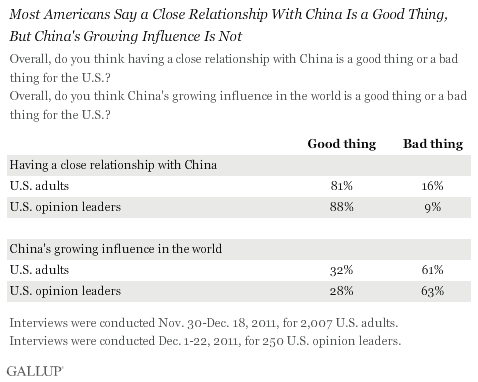
Perceptions about the development of U.S.-China relations over the past decade are varied in the U.S. Americans are slightly more likely to say relations between the U.S. and China have improved or stayed the same in the last 10 years than to say they have declined. About one-third of Americans (35%) and 43% of U.S. opinion leaders say relations between the U.S. and China have improved in the last decade. Twenty-eight percent of U.S adults and 22% of U.S. opinion leaders say relations have declined, and one-third of each group says relations have stayed the same.
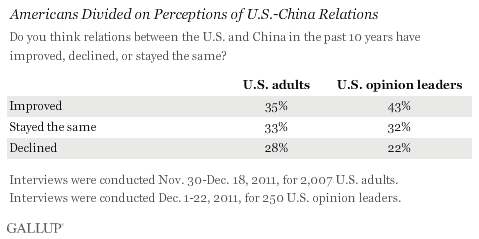
When asked about their own opinions of China, about half of each group says their personal views of China have not changed in the last five years. One in five Americans and 28% of U.S. opinion leaders say their opinion has improved. For 28% of U.S. adults and 22% of opinion leaders opinions have declined over the same time span.
Lack of Trust Tops List of Potential Barriers to Better Relations
While most Americans say are important, they also perceive major barriers to achieving this. Three-fourths note a lack of trust between the two countries as a major barrier. Majorities also see the , an increasing demand for natural resources, and different political systems as major barriers to strong U.S.-China relations.
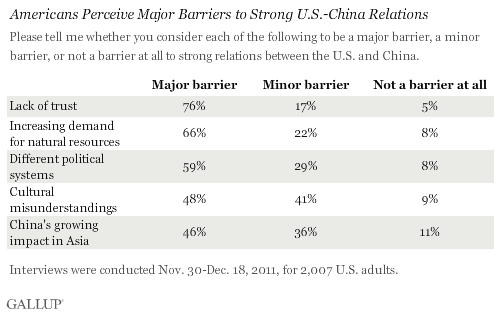
U.S. opinion leaders hold similar views as the general public about barriers to strong U.S.-China relations with lack of trust topping the list. Opinion leaders are less likely than U.S. adults to say cultural misunderstandings are a major barrier, at 40% and 48%, respectively.
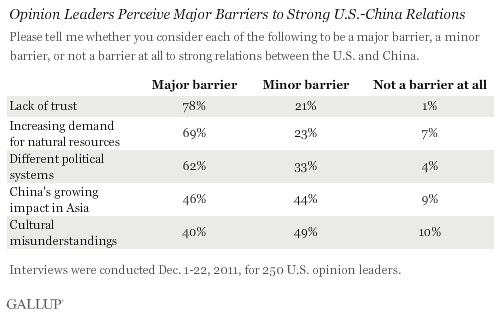
Another perceived barrier to strong U.S.-China relations could be Americans' perceptions of China as a military threat. About half of the American public (51%) and 60% of opinion leaders say China's growing military is a threat to U.S. national security. Eighteen percent of U.S. adults and 17% of opinion leaders disagree.
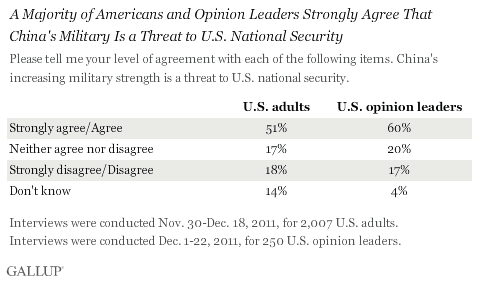
Many Americans also express concern over human rights in China. More than one-third of U.S. adults (38%) are "very concerned" and 31% are "somewhat concerned" about this issue. Twenty-two percent of U.S. adults don't know enough to say. Opinion leaders in the U.S. are even more likely to express concern about human rights in China -- 54% are very concerned and 32% are somewhat concerned.
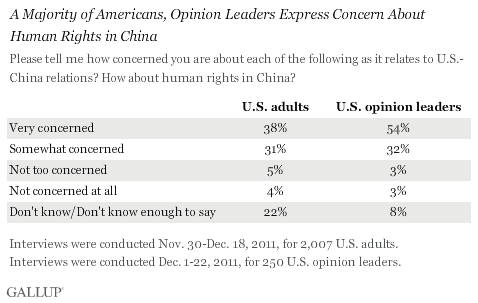
Opinion leaders are also more likely than the American public to express concern about Taiwan and Tibet, as it relates to U.S.-China relations. About four in 10 Americans say they don't know enough about Taiwan and Tibet to say whether or not they are concerned about this issue.
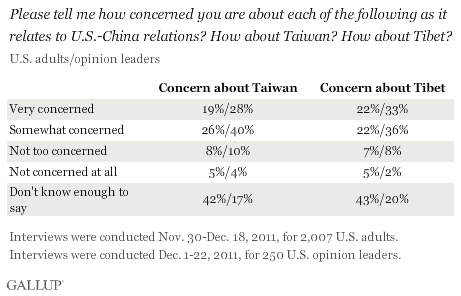
U.S. Economic Situation Viewed as a Factor in U.S. Arms Sale to Taiwan
U.S.-China relations were strained after the U.S. government approved a $5.8 billion arms sale to Taiwan in 2011 -- a deal China objected strongly to. Nearly half (48%) of Americans say the U.S. economic situation was a major factor in the U.S. government's decision to sell arms to Taiwan. Twenty-four percent say it was a minor factor. U.S. opinion leaders were less likely, at 39%, to say economics was a major factor in this decision.
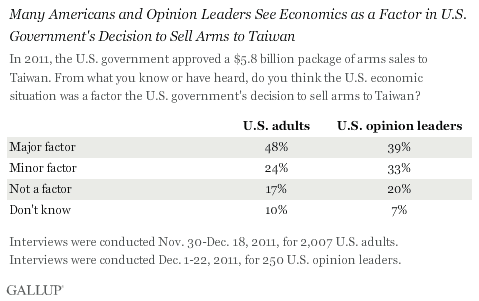
Nearly half of Americans and U.S. opinion leaders expressed concern about the effect of this arms sale on U.S.-China relations. Fifteen percent of Americans and 11% of opinion leaders are "very concerned." About one-third in both groups is somewhat concerned.
Implications
Many Americans view strong U.S.-China relations as positive for the U.S.; however, they perceive barriers and express concerns over a number of issues that will impact this relationship, including China's growing military, a general lack of trust between the two countries, concerns about human rights, and a growing demand for natural resources. While there are many policy areas where the U.S. and China diverge, there are also shared interests and opportunities for collaboration. Many Americans and U.S. opinion leaders express support for strengthening relations between China and the U.S.
Survey Methods
In the first wave of a new research partnership between China Daily USA and Gallup, 2,007 Americans were interviewed in English only from Nov. 30-Dec. 18, 2011.优蜜传媒surveyed a random sample of adults, aged 18 and older, residing in landline-telephone households, cell phone-only households, and cell phone-user households. The data set was statistically adjusted (weighted) using the following variables: race/ethnicity, gender, education, and age as defined by the most recent data from the Current Population Survey, conducted by the U.S. Census Bureau. The final overall results are representative of the U.S. adult population. For results based on the total sample size of 2,007 adults, one can say with 95% confidence that the margin of error attributable to sampling and other random effects is 卤2.68 percentage points.
The opinion leader survey included a non-probability sample 250 opinion leaders, drawn from the ranks of business executives (n=50), government officials (n=50), think tank leaders (n=50), university faculty (n=50), and the media (n=50). The opinion leaders sample was collected from Dec. 1-22, 2011.
In addition to sampling error, question wording and practical difficulties in conducting surveys can introduce error or bias into the findings of public opinion polls. Click to learn more about China Daily USA.
